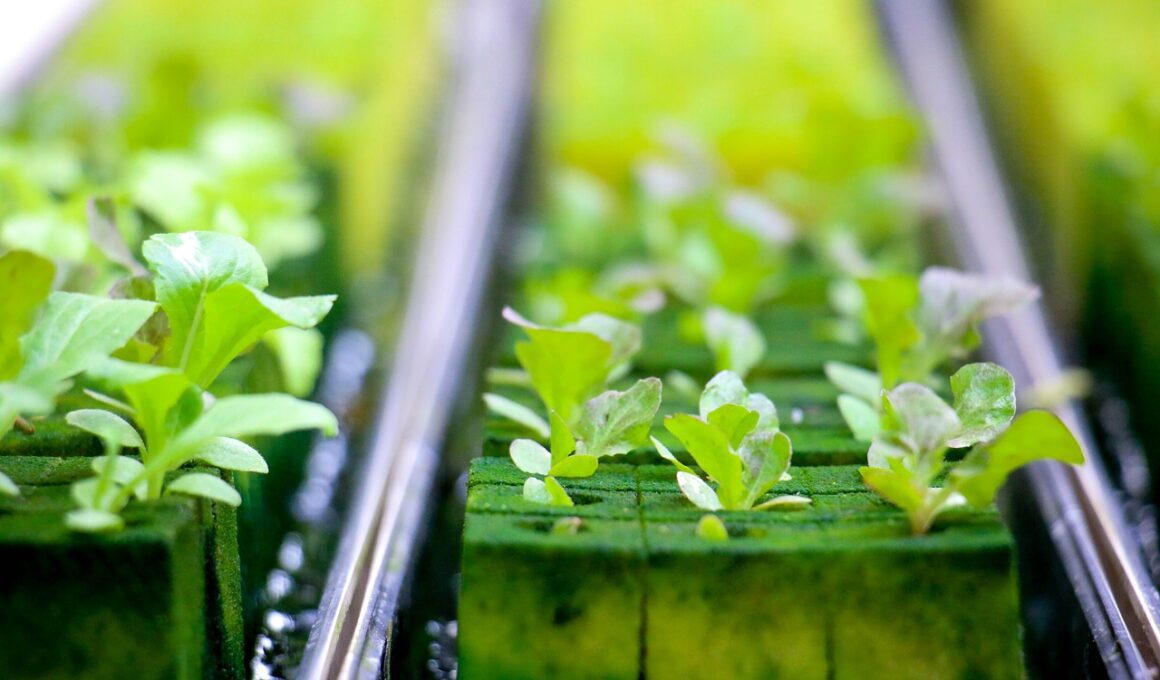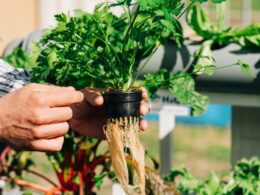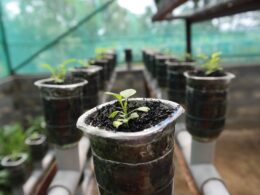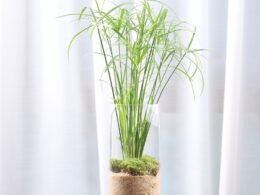Are you new to hydroponic gardening and wondering if you need to change the water in your system? The answer is yes, you do.
The water in your hydroponic system plays a crucial role in providing nutrients and oxygen to your plants. However, it can also become a breeding ground for harmful bacteria and algae if not properly maintained.
In this article, we’ll explore the importance of water in hydroponic systems, factors that affect water quality, signs that indicate it’s time to change the water, and tips for maintaining water quality to ensure your plants thrive in a safe and healthy environment.
So, let’s dive in!
Understanding the Role of Water in Hydroponic Systems
By comprehending the importance of water in hydroponics, you can enhance the growth of your plants and maximize their yield. Water is a crucial element in hydroponic systems as it serves as a carrier for nutrients and dissolved oxygen. It is responsible for delivering nutrients to the roots and facilitating their absorption, which is essential for plant growth.
Water circulation is another critical aspect of hydroponic systems. The water should be continuously moving to ensure that the nutrients are evenly distributed throughout the system. If stagnant water is left in the system, the chances of algae growth and the development of harmful bacteria increase. Therefore, it is necessary to ensure that the water is continuously flowing, creating a favorable environment for plant growth.
The nutrient solution in a hydroponic system is not infinite, and it requires replenishment from time to time. Therefore, it’s essential to change the water in your hydroponic system regularly. Changing the water every two to three weeks can help ensure that the plants receive the necessary nutrients for healthy growth. Neglecting to change the water can lead to nutrient deficiencies, which can negatively impact plant growth and yield. So, remember to change the water in your hydroponic system to keep your plants healthy and thriving.
Factors that Affect Water Quality
The quality of the water in your hydroponic setup is impacted by various factors. To keep your plants healthy, it’s essential to understand these factors and how they can affect the water quality. Here are some of the most critical factors to consider:
- Maintaining the correct pH balance is crucial for plant growth. If the pH level is too high or too low, it can affect the absorption of nutrients, leading to stunted growth and nutrient deficiencies.
- Regularly monitoring the nutrient levels in your water is essential to prevent deficiencies and ensure healthy plant growth. If you notice any signs of nutrient deficiencies, such as yellowing leaves or slow growth, adjust the nutrient levels accordingly.
- The temperature of the water can impact the growth of your plants. Make sure to keep the water temperature between 65-75°F to ensure optimal growth.
- The quality of your water source can also impact the water quality. If your water source is high in minerals or contaminants, it can affect the pH level and nutrient levels, leading to unhealthy plants.
- Adequate oxygen levels are essential for healthy root growth. Make sure to aerate the water regularly to ensure optimal oxygen levels.
By understanding these factors and taking the necessary steps to maintain optimal water quality, you can prevent nutrient deficiencies and ensure healthy plant growth. Regularly monitoring the pH level, nutrient levels, water temperature, water source, and oxygen levels is key to maintaining a healthy hydroponic setup. By doing so, you can enjoy a bountiful harvest of fresh, healthy produce.
Signs that Water Needs to be Changed
It’s important to pay attention to certain indications that may suggest time for a refresh of the water in your setup.
One of the most obvious signs is a change in water color or clarity. If the water starts to look murky or cloudy, it’s time to test the water quality and identify any contaminants that may be present. These contaminants can be harmful to your plants, and can even affect the taste of your produce.
Another sign that it’s time to change your hydroponic system’s water is a change in pH levels. If the pH levels are too high or too low, your plants will not be able to absorb the nutrients they need to grow. Water testing is crucial to ensure that pH levels are within the appropriate range.
Additionally, if you notice an unpleasant odor coming from the water, it’s time to change it. This can be a sign of bacterial growth or other harmful contaminants.
Using filtered water can provide numerous benefits for your hydroponic system. It eliminates impurities and ensures that your plants receive the necessary nutrients for optimal growth. It also reduces the risk of introducing harmful contaminants into your setup.
By paying attention to these signs and using filtered water, you can ensure a healthy and productive hydroponic system.
How Does Changing the Water in My Hydroponic System Affect the Watering Schedule for My Plants in Soil?
Changing the water in your hydroponic system may not directly affect the watering frequency for hydroponic plants in soil. These systems operate differently, with hydroponics relying on nutrient-rich water and soil-based plants accessing nutrients from the soil. However, it is essential to maintain a consistent watering schedule tailored to the specific needs of each system to ensure optimal plant growth and health.
How Often to Change Water
Are you wondering how often you should refresh the water in your setup to ensure your plants get the nutrients they need?
The frequency of water changes depends on the type of hydroponic system and plants you have. Generally, experts recommend changing the water every 2-3 weeks.
However, if you notice any changes in the water’s color, odor, or pH level, you should change it immediately.
Water testing methods can help you determine when it’s time to change the water. You can use a TDS meter to measure the total dissolved solids in the water. If the TDS level is too high, it means the nutrients in the water have been depleted, and it’s time to change it.
You can also use a pH meter to measure the water’s acidity level. If the pH level is too high or too low, it can affect the plants’ ability to absorb nutrients.
In summary, changing the water every 2-3 weeks is a good practice, but testing the water regularly can help you determine when it’s time to change it. By following these guidelines, you can ensure your plants receive the nutrients they need to thrive.
Tips for Maintaining Water Quality
To maintain optimal water quality in your setup and keep your plants healthy, you’ll want to follow these helpful tips.
First and foremost, make sure to regularly test the water in your hydroponic system. This will help you keep track of the pH levels and nutrient content. You can use a water testing kit to check the water’s pH balance and adjust it accordingly. A pH level of 5.5 to 6.5 is ideal for most hydroponic setups.
In addition to testing the water, you should also make sure to balance the pH levels. If the pH is too high or too low, it can affect the nutrient uptake of your plants. You can use pH adjusting solutions to balance the pH levels. These solutions are available at most gardening stores and online. Be sure to follow the instructions on the label carefully and adjust the pH levels gradually.
Lastly, to maintain water quality in your hydroponic system, you should remove any dead plant material or debris that may be floating in the water. This will prevent the growth of harmful bacteria and fungi. You can also add beneficial bacteria to your system to help break down organic matter and maintain a healthy environment for your plants.
By following these tips, you can maintain optimal water quality in your hydroponic system and ensure your plants thrive.
Frequently Asked Questions
Can I reuse the water from my hydroponic system?
When considering reusing water in your hydroponic system, it’s important to take into account water quality and nutrient concentration. While it may seem like an easy way to save time and money, reusing water can lead to a buildup of salts and other minerals that can harm your plants.
Additionally, as your plants absorb nutrients from the water, the concentration of those nutrients decreases, meaning that reusing the same water can lead to nutrient deficiencies.
It’s best to err on the side of caution and change the water in your hydroponic system regularly to ensure your plants are receiving the proper nutrients and water quality.
What kind of water should I use for my hydroponic system?
To ensure optimal growth and yield of your hydroponic plants, it’s important to use filtered water in your system. Unfiltered water may contain harmful chemicals and minerals that can negatively impact plant growth.
Additionally, the pH level of the water is crucial for plant health. The ideal pH range for hydroponic plants is between 5.5 and 6.5. If the pH level is too high or too low, it can lead to nutrient deficiencies and stunted growth. Therefore, it’s recommended to regularly test and adjust the pH level of your water.
By using filtered water and maintaining the proper pH level, you can ensure the best possible environment for your hydroponic plants to thrive.
How do I know if my plants are getting enough nutrients from the water?
Ensuring that your plants are receiving enough nutrients from the water is crucial for their growth and health. Nutrient deficiency can lead to stunted growth, yellowing leaves, and even death.
It’s important to maintain the pH balance of your hydroponic system to ensure the nutrients are being absorbed properly. A pH imbalance can prevent your plants from absorbing the necessary nutrients, even if they are present in the water.
Regularly monitoring the pH balance and adjusting accordingly can prevent nutrient deficiencies and ensure your plants thrive.
Is it okay to add supplements to the water in my hydroponic system?
To achieve optimal plant growth, it’s okay to supplement water in hydroponic systems, which can provide numerous benefits. However, it’s important to choose the right supplements for your plants.
Supplements can help improve plant health and growth, increase yield, and enhance flavor. Some popular supplements include calcium, magnesium, and iron.
It’s important to carefully research and select supplements that are specific to the needs of your plants, as adding too much of a certain nutrient can be harmful. By adding the right supplements to your hydroponic system, you can provide your plants with the necessary nutrients they need to thrive, resulting in healthy and bountiful harvests.
How do I dispose of old water from my hydroponic system?
When it comes to hydroponic systems, it’s important to know how to dispose of old water properly. There are several methods for hydroponic water disposal, including using it to water non-edible plants, flushing it down the toilet, or simply pouring it down the drain.
However, it’s important to consider the environmental impact of disposing of hydroponic water, as it can contain nutrients and chemicals that can harm aquatic life if not properly treated. To minimize your environmental impact, consider using a water treatment system or disposing of the water in a way that won’t harm the environment.
By taking these steps, you can ensure that you’re doing your part to keep our planet safe while still enjoying the benefits of hydroponic gardening.
Conclusion
So, do you need to change the water in your hydroponic system? The answer is yes, you do! Water plays a critical role in the success of your hydroponic garden, providing the essential nutrients your plants need to grow.
However, water quality can be affected by various factors, including pH levels, nutrient buildup, and the growth of algae and bacteria.
To ensure healthy plant growth and prevent issues such as root rot, it’s important to regularly monitor and maintain the quality of your hydroponic system’s water. Signs that it’s time to change the water include a strong odor, cloudy or discolored water, and a decrease in plant growth or overall health.
By staying on top of water changes and implementing proper maintenance techniques, you can help your hydroponic garden thrive. Keep in mind that each system is unique, so it’s important to follow the manufacturer’s recommendations and adjust your water change schedule as needed.
In summary, changing the water in your hydroponic system is essential for maintaining healthy plant growth and preventing issues such as root rot. By understanding the factors that affect water quality and implementing proper maintenance techniques, you can ensure the success of your hydroponic garden.
Remember to regularly monitor your system and adjust your water change schedule as needed to keep your plants happy and thriving. Happy gardening!









